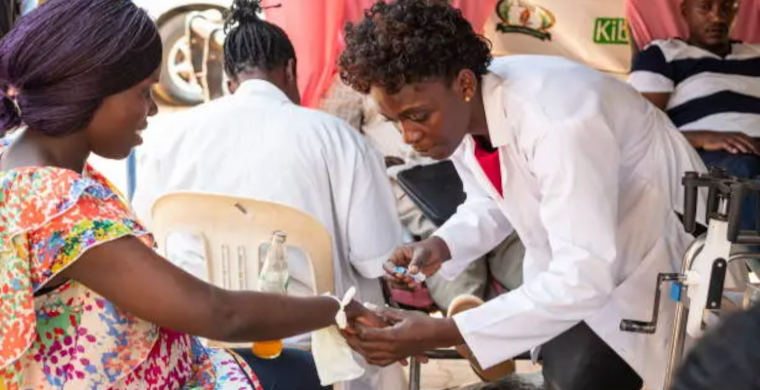Anglican efforts in Africa weakened by Ukraine crisis
Anglican aid groups are grappling with program delivery as the Ukraine crisis continues. Picture: iStock.
By Jenan Taylor
https://tma.melbourneanglican.org.au/
21 June 2022
Aid groups say the Russian invasion of Ukraine has put a strain on their aid and resilience building efforts in many African nations.
Anglican Overseas Aid and the global Anglican Mother's Union reported that the crisis was driving shortages that in turn were imperilling Africa-based programs including work on gender-based violence prevention and children's rights.
Their comments came as Human Rights Watch noted that many African countries relied on Russia and the Ukraine for wheat, fertiliser and vegetable oil, and that shortages were leading to a spike in food prices.
Last week the United Nations World Food Program also said the Ukraine situation was exacerbating climbing food prices and fuel shortages that had already been affected by COVID, regional conflicts and climate-related disasters in many African communities.
The Mother's Union movement's headquarters in the UK said soaring food and oil prices had affected its literacy programs in Ethiopia in the last three months.
The group's regional development lead Naomi Herbert said the programs used participatory Bible studies and activities to help local communities assess their challenges and identify ways to help them overcome them.
Ms Herbert said food and oil costs were causing unrest and that the group's coordinator in that area had fled because of the violence and lack of food.
She also said that in Sudan, Mother's Union usually helped communities develop skills and small enterprises to enable food security.
But Ms Herbert said scarcity of bread and other staples from the past few years had contributed to coups in that area.
She said COVID lockdowns, fuel increases, and the indirect effects of the Ukraine crisis were threatening stability and were preventing program delivery teams from travelling.
Despite that, Mother's Union Sudan's female adult literacy participants were digging in their heels. "They are continuing to meet even in these difficult times to provide support and hope to each other as they become literate together. Just what is needed in these difficult times," she said.
Ms Herbert said the spiralling cost of food put a strain on program budgets however, not to mention the family household expenses of many communities.
She said there was also a risk that rising costs of living and food would contribute increased incidences of gender-based violence (GBV), and potentially cripple the organisation's efforts aimed at preventing GBV.
Ms Herbert also said that their literacy program in Burundi had stalled because of fuel shortage and their vehicle couldn't be moved for an entire month because there was no diesel in the capital.
Regional development program lead, Stephanie Mooney said shortages would affect the GBV and mental health initiatives being delivered in southern Africa, Uganda and Kenya.
Ms Mooney said in Lesotho for example, facilitators were trained to raise awareness about issues such as sexual violence justice and advocacy within their respective dioceses and parishes.
They also worked with police, counsellors, survivors, and with primary schools children to challenge gender stereotypes, Ms Mooney said.
Mother's Union Australia provincial president the Reverend Anne Kennedy said Anglicans in Australia were helping to support the global group's initiatives in Africa through prayer and monetary donations.
Anglican Overseas Aid's international program's manager Kylie Wingjan said she had received reports of a large increase in the price of fuel which then had a knock-on effect on food and essentials.
Ms Wingjan said the spike affected the ability of producers in the African nations in which they worked to transport their goods and thereby created scarcity of local fresh produce.
She said the increases were also driving inflation upwards and especially affecting poorer populations who were also still dealing with the fallout from COVID.
All these were impacting on tensions around ethnic violence in Sudan and South Sudan and the 700,000 people who were internally displaced in Mozambique.
Ms Wingjan said AOA was working with a coalition of faith-based agencies to respond to those issues and was appealing to people to not forget Africa as the crisis in eastern Europe escalated.














